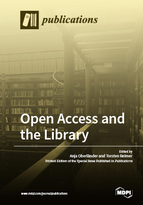Open Access and the Library
A special issue of Publications (ISSN 2304-6775).
Deadline for manuscript submissions: closed (20 March 2018) | Viewed by 75915
Special Issue Editors
Special Issues, Collections and Topics in MDPI journals
Special Issue Information
Dear Colleagues,
Once a grassroots movement, Open Access (OA) is now making its way to the heart of university libraries and research organisations more broadly. Within a research institution, libraries are usually the facilitators of the transition to OA and, in some cases, they are the driving force behind this change. This process is also changing the role of libraries. Historically, library expertise lay in procuring content (both electronic and print) and negotiating access for students and researchers. Now libraries are asked to lead on the development and implementation of new OA services, including operation of repositories, setting up university presses and supporting OA journals. Many libraries also administrate OA publication funds. Building on their understanding of scholarly practices and information needs across disciplines libraries are now working to create successful OA implementation strategies by cooperating closely with university leadership, research offices and other research administrators, and by engaging closely with researchers from across the institution.
This results in a shift of focus from procuring scholarly content to becoming a more active partner in creation and dissemination. It also marks the start of what may well become a shift away from subscription budgets to OA publication budgets, with all the changes that brings for the structure of libraries and the roles of staff. Through this Special Issue, we want to explore the changing role of research and university libraries in the context of Open Access.
Topics of interest include, but are not limited to:
- The changing role of university/research libraries
- Best practice examples of successful OA implementations
- Management of OA publication funds
- OA workflows and systems
- Communications and engagement with authors
- Change management related to OA
- New staff roles, skills and training
We welcome a variety of submissions, including, but not limited to, thought pieces, theoretical discussions, research reports with empirical data, or reviews of relevant literature that lead to new insights for the field.
All submissions will undergo the journal’s regular peer review and standard editorial procedures, using double-blind review. Please remove all reference to the author/s of the submission in the text and reference list. We look forward to your contributions and remain open to any questions you may have.
Dr. Anja Oberländer
Dr. Torsten Reimer
Guest Editors
Manuscript Submission Information
Manuscripts should be submitted online at www.mdpi.com by registering and logging in to this website. Once you are registered, click here to go to the submission form. Manuscripts can be submitted until the deadline. All submissions that pass pre-check are peer-reviewed. Accepted papers will be published continuously in the journal (as soon as accepted) and will be listed together on the special issue website. Research articles, review articles as well as short communications are invited. For planned papers, a title and short abstract (about 100 words) can be sent to the Editorial Office for announcement on this website.
Submitted manuscripts should not have been published previously, nor be under consideration for publication elsewhere (except conference proceedings papers). All manuscripts are thoroughly refereed through a single-blind peer-review process. A guide for authors and other relevant information for submission of manuscripts is available on the Instructions for Authors page. Publications is an international peer-reviewed open access quarterly journal published by MDPI.
Please visit the Instructions for Authors page before submitting a manuscript. The Article Processing Charge (APC) for publication in this open access journal is 1400 CHF (Swiss Francs). Submitted papers should be well formatted and use good English. Authors may use MDPI's English editing service prior to publication or during author revisions.






